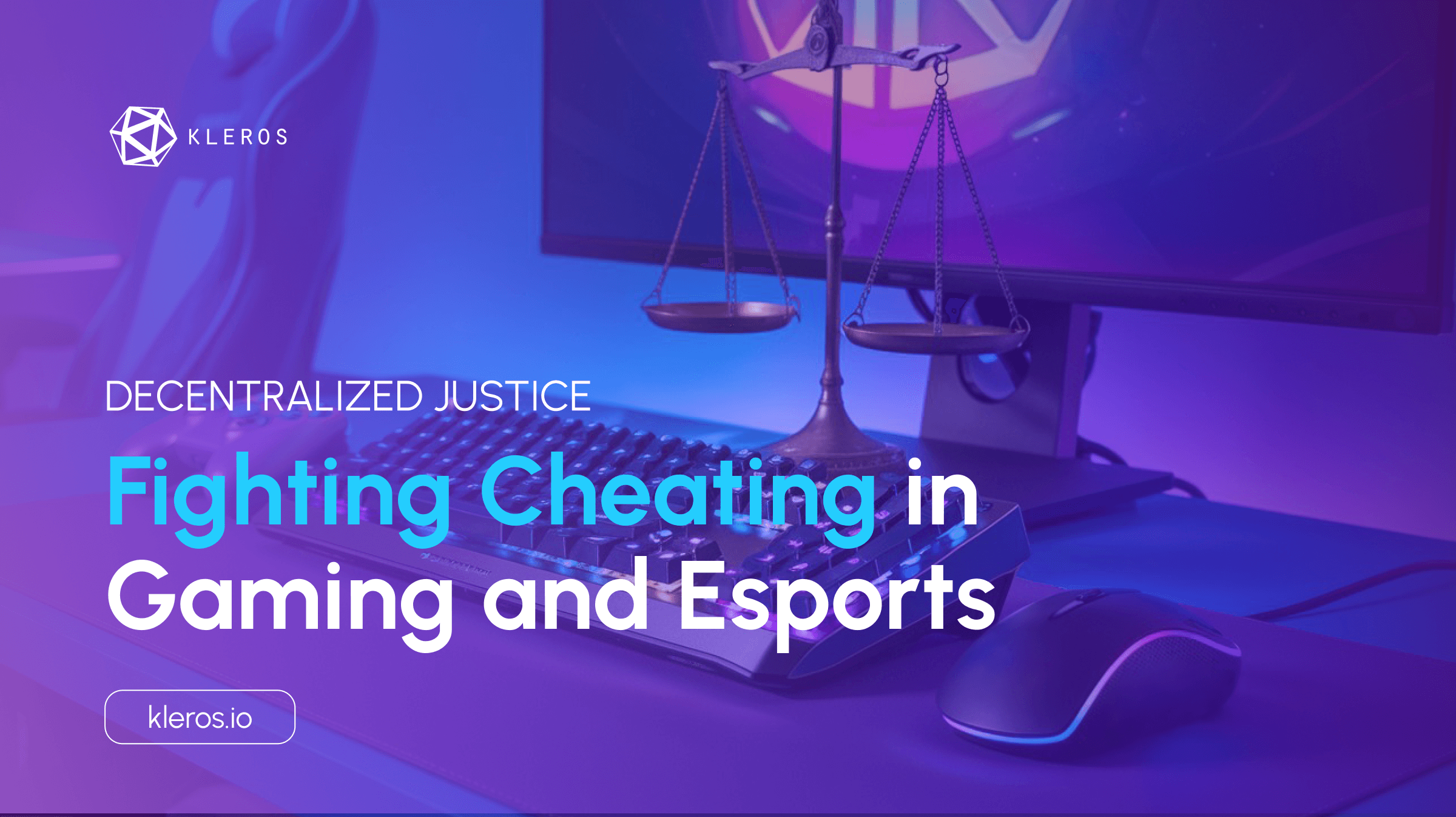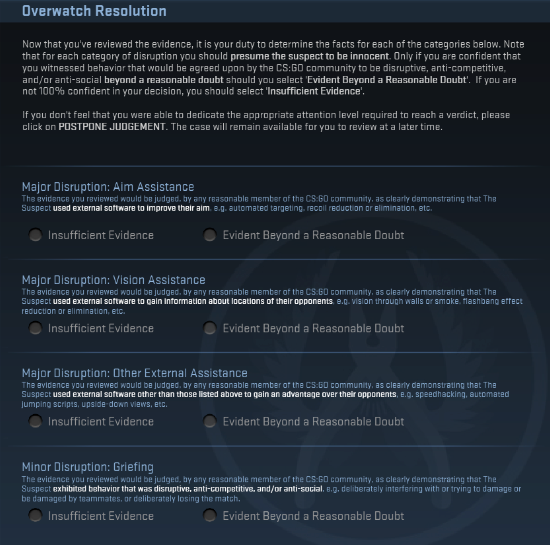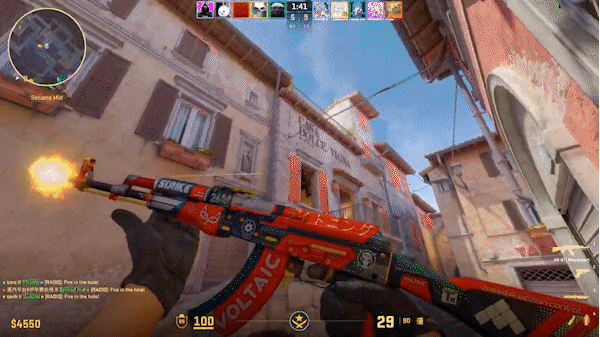Decentralized Justice: Fighting Cheating in Gaming and Esports

How platforms such as Kleros can bring transparency, speed and fairness to competitive play...
As online gaming and esports continue to grow, so do the number of disputes arising from competitive play, cheating, and contractual issues. Traditional methods of resolving these conflicts—such as moderators, manual review systems, or even legal processes—can be slow, inefficient, and lack transparency.
Enter decentralized justice, a new way to resolve disputes that leverages blockchain technology, transparency, and economic incentives to provide fast and fair resolutions.
In this article, we’ll explore how decentralized justice works, with a focus on how it can revolutionize dispute resolution in gaming and esports.
What is Kleros?
At the forefront of the decentralized justice movement is Kleros, a blockchain-powered system designed to resolve disputes in a fair and efficient manner.
Kleros combines the principles of crowdsourced decision-making with the transparency and immutability of blockchain. Essentially, it allows jurors—members of the community—to resolve disputes by reviewing evidence and making decisions.
Kleros operates as a decentralized decentralized dispute resolution platform that can be used across a range of industries such as finance, insurance, e-commerce and government among others.
The system is particularly well-suited for the fast-paced environments of gaming and esports.
Disputes in Gaming and Esports: The Scope of the Problem
The rise of online gaming and esports has created fertile ground for disputes of all types.
According to a 2023 Newzoo report, the global gaming market generated over $187 billion, with 3.38 billion players worldwide. This rapid growth brings not only financial stakes but also a significant increase in conflicts.
For instance, disputes in gaming and esports can range from cheating accusations to payment disputes, and contractual disagreements involving teams, sponsors, or tournament organizers.
A report by the Esports Integrity Commission (ESIC) highlighted that cheating is a major issue, with over 8,000 cheating complaints filed in esports tournaments in 2020 alone.
Cheating software, like aimbots and wallhacks, are particularly prevalent in first-person shooter games like Counter-Strike, Call of Duty, and Fortnite, which have some of the largest esports followings. Additionally, contractual disputes between players and teams have also surged, especially as esports teams become more structured and professionalized.
With such high volumes of disputes, traditional systems of resolution are struggling to keep pace. This is where decentralized justice steps in.
Inspiration from Overwatch
To understand how Kleros works in gaming, let’s take a look at its inspiration—Counter-Strike’s Overwatch system. In Counter-Strike, players could be accused of cheating, which triggered a review by a panel of other players. This crowd-based system allowed gamers to watch replays of the game and make decisions on whether cheating occurred.

While Overwatch was a good example of crowd-sourcing for dispute resolution, it had one major flaw: a lack of transparency. The selection of jurors, how votes were counted, and the decision-making process itself were hidden from the public. This “black box” approach limited the system’s fairness and trustworthiness.
The Role of Blockchain in Dispute Resolution
This is where blockchain technology comes in. Blockchain enables transparent, decentralized decision-making. In Kleros, disputes are reviewed by randomly selected jurors, and all steps of the process are open and verifiable on the blockchain.
• Juror Selection: Jurors are selected fairly using a random, verifiable process.
• Evidence Security: All evidence is stored on the blockchain, ensuring it cannot be tampered with.
• Vote Transparency: Voting is transparent and auditable, preventing any manipulation or hidden processes.
By leveraging these blockchain properties, Kleros makes the dispute resolution process fairer, faster, and more trustworthy.
Resolving Disputes in Gaming and Esports
Let’s bring this into the context of gaming and esports. Imagine you’re a player in an esports tournament, and you believe your opponent is using an aimbot—a type of cheating software that automatically improves aim.
In traditional systems, the process to investigate such claims could take time, requiring manual reviews by game moderators.
With Kleros, the process becomes faster, transparent, and decentralized:
1. Dispute Report: Viewers or players watching the match can file a cheating report, backing it with a small deposit to show they are serious.
2. Juror Panel: The case is then sent to a panel of Kleros jurors who specialize in gaming disputes. They review the evidence (such as game footage) and decide if cheating occurred.

3. Decision and Reward: If the jurors agree that the aimbot was used, the offending team may be disqualified, and the deposit they made to enter the tournament is awarded to the challengers who filed the report.
This method of decentralized dispute resolution ensures that decisions are made quickly and fairly, allowing tournaments to proceed without lengthy delays.
Decentralized justice has a number of advantages over traditional dispute resolution:
1. Speed: Disputes in gaming and esports need to be resolved quickly, often in real-time during tournaments. Kleros can handle cases much faster than traditional systems.
2. Efficiency: Decentralized systems like Kleros are scalable, meaning they can handle a large number of cases without the overhead of manual reviews or court processes.
3. Transparency: By using blockchain, the entire process is open to scrutiny, ensuring trust in the decisions that are made.
4. Cost-Effectiveness: Traditional arbitration or legal proceedings can be expensive and time-consuming. Decentralized justice offers a far more affordable and accessible solution for resolving disputes.
Could we also use Kleros for a decentralized version of VAR in football? Check out this article that proposes a CrowdVAR system.
Conclusion: The Promise of Decentralized Justice in Gaming
The world of gaming and esports is fast-paced and competitive, with disputes arising regularly—whether it’s over cheating accusations, tournament outcomes, or contractual disagreements. Traditional systems are often ill-equipped to handle these disputes with the speed and transparency that the gaming industry demands.
Decentralized justice, powered by platforms like Kleros, offers a revolutionary solution. By combining blockchain technology, transparency, and economic incentives, Kleros provides a fair and efficient way to resolve disputes in gaming, esports, and beyond.
Want to see decentralized justice in action? Watch this video to dive deeper into how it’s transforming dispute resolution across industries:
Federico Ast presenting the use of Kleros in gaming and eSports at the "Dispute Resolution in the eSports Industry" at the University of Neuchatel. May, 2024.
